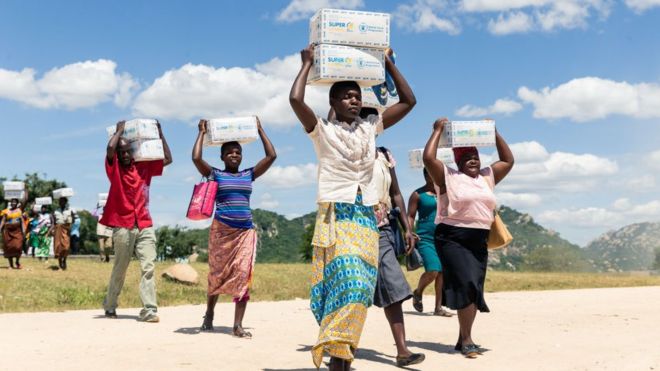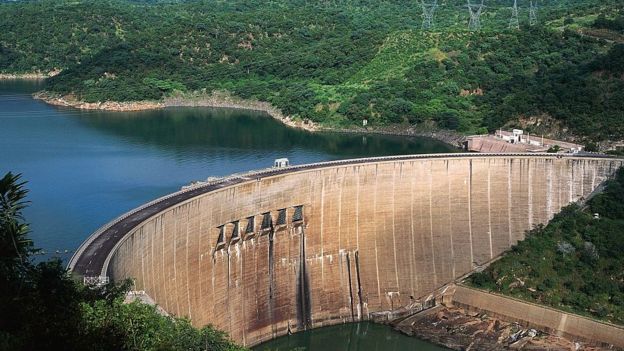Almost a third of the population needs food aid, with many in danger of starvation, the UN says.
Source: Zimbabwe: A third of population faces food crisis, says UN – BBC News
 Poor harvests have left many in need of humanitarian aid
Poor harvests have left many in need of humanitarian aidMore than five million people in Zimbabwe – about a third of the population – need food aid, with many coming close to starving, the UN says.
The World Food Programme (WFP) has launched a $331m (£270m) appeal as the country battles the effects of drought, a cyclone and an economic crisis.
David Beasley, head of the WFP, said many were “in crisis emergency mode… marching towards starvation”.
Once a regional bread basket, Zimbabwe has suffered years of turmoil.
Recent harvests have been badly affected by drought and the price of food has risen sharply. Low water levels have also hit the main hydro-electric plant at Kariba, triggering rolling power cuts across the country.
The country is also facing a financial crisis and has reintroduced the Zimbabwe dollar a decade after it was abandoned amidst rampant inflation.
Launching the appeal on Tuesday, Mr Beasley said about 2.5 million people were on the cusp of starvation.
“We are talking about people who truly are marching towards starvation if we are not here to help them,” he said.
“We are facing a drought unlike any that we have seen in a long time.”
 The drought has reduced water levels at Kariba, cutting electricity generation
The drought has reduced water levels at Kariba, cutting electricity generationZimbabwe’s problems were exacerbated when Cyclone Idai swept through the region earlier this year.
The huge storm, which also hit parts of Malawi and Mozambique, affected 570,000 Zimbabweans and left tens of thousands of them homeless.

Last week, Finance Minister Mthuli Ncube said the government had been providing grain to 757,000 homes since January, in both rural and urban areas.
And on Tuesday, President Emmerson Mnangagwa, who took over from long-time ruler Robert Mugabe in November 2017, declared the drought a national disaster.
The UN was already appealing for $294m for Zimbabwe but says it now needs more funding as the impact of the drought has spread.
COMMENTS
I object strenuously to the order of causes of the lamentable situation Zimbabwe finds itself in, as they appear in this article. Far greater than the drought (that was never an issue when farms were owned by competent farmers who planned for anomalies in the weather. No matter what the conditions, they fed the nation, and exported the surplus. Why don’t the journalists, including the BBC tell it like it is: rampant corruption, incompetence and greed above all have caused the total collapse of the ‘breadbasket of Africa.
Correct exactly as you stated. There is nothing more to be said on these matters. The reports for some reason do not wish to say it as it should. BBC included . They tend to help make excuses for the Politicians. Is this a hidden agenda ? Why ? Perhaps a Politically correct reason. Ignore the truth cannot upset certain countries. It should be reported as it is. They have made a mess of Zimbabwe. Incapable /incompetent of running a Country despite 30+ years of Independece. What a disgrace what a shame.